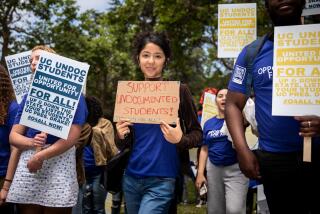UC appeals after judge finds sexual misconduct investigation unfair
- Share via
University of California regents have appealed a court ruling that found UC San Diego was unfair to a student who had been suspended over allegations of sexual misconduct.
The case involved an unidentified male student who has continued to attend classes but faced a suspension of one year and one quarter after UC San Diego investigators found he had violated the university’s student sex offense policy by making unwanted, physical advances toward another student.
In July, San Diego County Superior Court Judge Joel Pressman reversed the school’s suspension order and ruled a UC San Diego board’s disciplinary action against the student was unfair and unsupported by evidence.
The regents filed an appeal Friday in a three-page notice to the California 4th District Court of Appeal. The document does not give any details about the case, and a University of California representative did not immediately respond to a request for comment.
“It’s disappointing that they don’t just take to heart the fault that Judge Pressman found with their process and correct their process,” said Los Angeles attorney Mark Hathaway, who represents the student.
Hathaway has defended more than 10 college students accused of sexual misconduct in the last two years. He said his growing caseload reflects a more aggressive stance schools are taking against sexual abuse.
That change, he said, began in 2011 after the U.S. Department of Education sent a letter urging schools to improve investigating and reporting of campus sexual assault or risk losing federal money.
The case involving the UC San Diego student is believed to be the first such ruling against the University of California.
Hathaway said he hopes the outcome could result in a fair process for students who are accused of sexual misconduct.
“Sometimes there’s no hearings, sometimes there’s a hearing,” he said. “I don’t think any college, and certainly not the University of California based on Judge Pressman’s ruling, has gotten it right yet,” he said. “The deck right now is stacked against someone who is accused. It’s very difficult to prove yourself innocent.”
According to the lawsuit, Hathaway’s client was 20 and his accuser, a female student, was 19 at the time of the incident. The two had been drinking heavily at a party the night of Jan 31, 2014, and later had consensual sex, the suit said.
The male student made physical advances toward the woman the next morning, Feb. 1, but stopped touching her after she repeatedly asked him to leave her alone, according to the suit.
They had consensual sex in her apartment the following night, but later had a falling-out, according to the lawsuit.
Four months after the incident, the woman reported the Feb. 1 incident to UC San Diego’s Office for the Prevention of Discrimination and Harassment.
In December, a university panel reviewed the case and recommended that the school suspend the male student for a quarter. A dean in January increased the suspension to a year. After the student appealed to a panel of provosts, the suspension was increased to a year and a quarter.
In his ruling, Pressman said the UC San Diego investigation unfairly barred the student from asking questions that challenged his accuser’s account. The judge also wrote that evidence did not support the investigation’s findings and that the school abused its discretion by increasing sanctions without explanation after the student’s appeals.
Gary Warth writes for the San Diego Union-Tribune.
More to Read
Sign up for Essential California
The most important California stories and recommendations in your inbox every morning.
You may occasionally receive promotional content from the Los Angeles Times.










